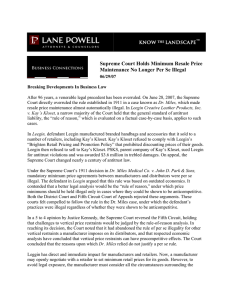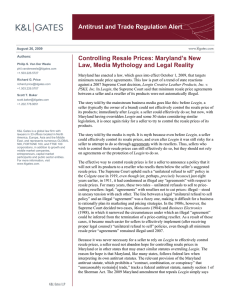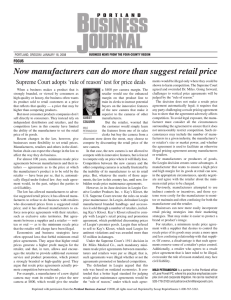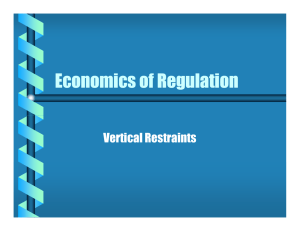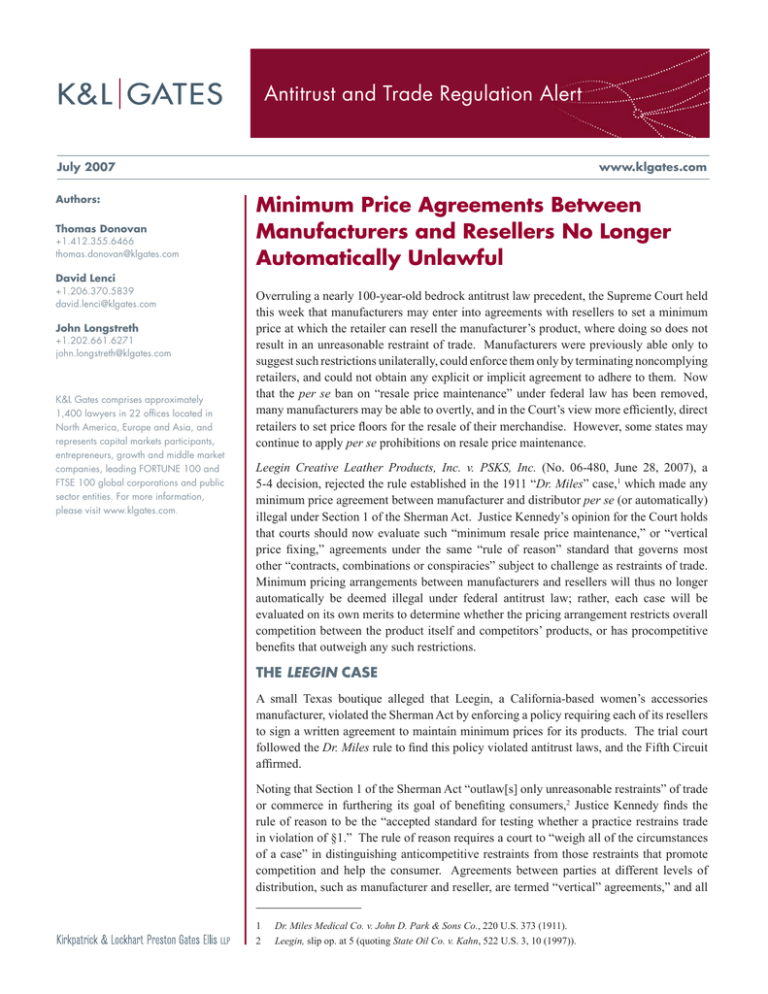
Antitrust and Trade Regulation Alert
July 2007
Authors:
Thomas Donovan
+1.412.355.6466
thomas.donovan@klgates.com
www.klgates.com
Minimum Price Agreements Between
Manufacturers and Resellers No Longer
Automatically Unlawful
David Lenci
+1.206.370.5839
david.lenci@klgates.com
John Longstreth
+1.202.661.6271
john.longstreth@klgates.com
K&L Gates comprises approximately
1,400 lawyers in 22 offices located in
North America, Europe and Asia, and
represents capital markets participants,
entrepreneurs, growth and middle market
companies, leading FORTUNE 100 and
FTSE 100 global corporations and public
sector entities. For more information,
please visit www.klgates.com.
Overruling a nearly 100-year-old bedrock antitrust law precedent, the Supreme Court held
this week that manufacturers may enter into agreements with resellers to set a minimum
price at which the retailer can resell the manufacturer’s product, where doing so does not
result in an unreasonable restraint of trade. Manufacturers were previously able only to
suggest such restrictions unilaterally, could enforce them only by terminating noncomplying
retailers, and could not obtain any explicit or implicit agreement to adhere to them. Now
that the per se ban on “resale price maintenance” under federal law has been removed,
many manufacturers may be able to overtly, and in the Court’s view more efficiently, direct
retailers to set price floors for the resale of their merchandise. However, some states may
continue to apply per se prohibitions on resale price maintenance.
Leegin Creative Leather Products, Inc. v. PSKS, Inc. (No. 06-480, June 28, 2007), a
5-4 decision, rejected the rule established in the 1911 “Dr. Miles” case,1 which made any
minimum price agreement between manufacturer and distributor per se (or automatically)
illegal under Section 1 of the Sherman Act. Justice Kennedy’s opinion for the Court holds
that courts should now evaluate such “minimum resale price maintenance,” or “vertical
price fixing,” agreements under the same “rule of reason” standard that governs most
other “contracts, combinations or conspiracies” subject to challenge as restraints of trade.
Minimum pricing arrangements between manufacturers and resellers will thus no longer
automatically be deemed illegal under federal antitrust law; rather, each case will be
evaluated on its own merits to determine whether the pricing arrangement restricts overall
competition between the product itself and competitors’ products, or has procompetitive
benefits that outweigh any such restrictions.
THE LEEGIN CASE
A small Texas boutique alleged that Leegin, a California-based women’s accessories
manufacturer, violated the Sherman Act by enforcing a policy requiring each of its resellers
to sign a written agreement to maintain minimum prices for its products. The trial court
followed the Dr. Miles rule to find this policy violated antitrust laws, and the Fifth Circuit
affirmed.
Noting that Section 1 of the Sherman Act “outlaw[s] only unreasonable restraints” of trade
or commerce in furthering its goal of benefiting consumers,2 Justice Kennedy finds the
rule of reason to be the “accepted standard for testing whether a practice restrains trade
in violation of §1.” The rule of reason requires a court to “weigh all of the circumstances
of a case” in distinguishing anticompetitive restraints from those restraints that promote
competition and help the consumer. Agreements between parties at different levels of
distribution, such as manufacturer and reseller, are termed “vertical” agreements,” and all
1
2
Dr. Miles Medical Co. v. John D. Park & Sons Co., 220 U.S. 373 (1911).
Leegin, slip op. at 5 (quoting State Oil Co. v. Kahn, 522 U.S. 3, 10 (1997)).
Antitrust and Trade Regulation Alert
but minimum resale price maintenance agreements
are already judged under the rule of reason.
Conversely, the Dr. Miles rule held per se illegal
any vertical agreement to set minimum resale prices
between a manufacturer and a retailer, regardless
of the competitive effects of the vertical restraint.
Justice Kennedy states that courts should only use per
se rules in the Sherman Act context when considering
restraints “that would always or almost always
tend to restrict competition and decrease output.”3
Additionally, “to justify a per se prohibition a restraint
must have manifestly anticompetitive effects and lack
any redeeming value.”4
Leegin rules that the economic and competitive
effects of resale price maintenance restraints do not
justify a per se ban. Absent the precedential effect of
Dr. Miles, the majority finds that a fresh review of the
economic issues surrounding minimum resale price
maintenance contracts would lead the Court to find
the rule of reason to be the appropriate standard by
which to evaluate such agreements. Admitting that
“each side of the debate can find sources to support
its position,” the majority finds that most economists
agree that resale price maintenance can have procompetitive justifications, including the promotion
of “interbrand competition—the competition
among manufacturers selling different brands of
the same type of product—by reducing intrabrand
competition—the competition among retailers selling
the same brand.”5 The majority also cites many other
economic validations, for example that the elimination
of price competition between retailers forces stores to
“compete among themselves over services,” which
ultimately benefits the consumer.
The majority opinion notes that the Court has
progressively rejected per se treatment of non-price
vertical restraints, such as exclusive territories or
requiring certain retail practices regarding staffing or
store environment,6 and when considering “maximum
3
Leegin slip op. at 6 (quoting Business Electronics Corp. v.
Sharp Electronics Corp., 485 U.S. 717, 723 (1988)).
4 Leegin slip op. at 6 (internal quotations omitted).
5 Leegin slip op. at 10 (emphasis added).
6
See, e.g., Continental T.V., Inc. v. GTE Sylvania Inc., 433
U.S. 36 (1977) (using the rule of reason rather than the per se rule
to evaluate non-price vertical restraints).
resale price maintenance.”7 Leegin’s complete
overruling of Dr. Miles thus achieves intellectual
and jurisprudential coherence by applying this same
rule of reason to all vertical restraints imposed
by manufacturers on retailers. Justice Kennedy
emphasizes that the ruling will not simply open the
floodgates for minimum resale price maintenance
agreements: “as courts gain experience considering
the effects of these restraints by applying the rule of
reason over a course of decisions, they can … ensure
the rule operates to eliminate anticompetitive restraints
from the market and to provide more guidance to
businesses.”
EFFECTS OF LEEGIN ON THE
MANUFACTURER / RETAILER
RELATIONSHIP
In order to avoid the harshest effects of the Dr.
Miles rule, manufacturers have long relied on the
Colgate decision,8 issued eight years after Dr. Miles,
holding that no antitrust violation occurred unless
the manufacturer and retailer had an “agreement” to
establish minimum resale prices. Manufacturers were
permitted to unilaterally adopt “Colgate Policies,”
which announced their refusal to deal with resellers
who did not adhere to carefully set resale price
“floors” (the “Manufacturer’s Suggested Retail Price”
or MSRP), but did not allow actual agreement with
retailers on a resale price. In Leegin, the manufacturer
went too far with its Colgate Policy and conclusively
created bilateral agreements with its retailers regarding
minimum resale prices.
The Leegin decision allows manufacturers who already
implement effective Colgate Policies to determine
that concrete minimum resale price agreements with
their retailers will help them function more efficiently.
If challenged as anticompetitive measures in violation
of antitrust law, these agreements will no longer be
judged based on the stringent Dr. Miles rule and if the
manufacturer can show effective competition with
other manufacturers the agreements will likely be
upheld under federal law. As noted above, however,
applicable state laws on the subject must also be
considered.
7 Kahn, 522 U.S. 3 (1997) (rule of reason used rather than the
per se rule to evaluate maximum vertical price restraints).
8 United States v. Colgate & Co., 250 U.S. 300 (1919).
July 2007 | 2
Antitrust and Trade Regulation Alert
The Leegin decision does not change the judicial view
of “horizontal” conspiracies among manufacturers,
retailers, or others at the same level of distribution
to maintain price floors or ceilings. Such horizontal
action will still be judged under a per se rule and held
illegal without regard to its competitive effects. The
Leegin rule applies only to vertical agreements.
last eighteen months.10 Following the general practice
in government enforcement actions over the past few
decades, these rulings may direct private actions to
core anticompetitive conduct.
Leegin continues the recent trend of Supreme Court
rulings in favor of defendants in antitrust actions; it is
the fourth such case this term9 and the seventh in the
9
See Weyerhaeuser Co. v. Ross-Simmons Hardwood Lumber
Co., Inc., No. 05-381 (Feb. 20, 2007) (predatory buying claims must
meet the same strict standards as predatory selling allegations); Bell
Atlantic Corp. v. Twombly, No. 05-1126 (May 21, 2007) (plaintiffs
must plead more than a “bare assertion of conspiracy” to state a
claim under Section 1 of the Sherman Act, and must allege “enough
facts to state a claim to relief that is plausible on its face”); Credit
Suisse Securities (USA), LLC v. Billing, No. 05-1157 (June 18, 2007)
(broadening conditions under which extensive federal regulation of
securities industry conduct impliedly immunizes that conduct from
antitrust liability).
10 See Independent Ink Inc. v. Illinois Tool Works Inc., 126 S. Ct.
1462 (2006) (no presumption that a patent confers market power in
tying cases); Texaco Inc. v. Dagher, 126 S. Ct. 1276 (2006) (pricing
coordination among parties to a fully integrated joint venture not a
per se illegal conspiracy); Volvo Trucks N. Am. Inc. v. Reeder-Simco
GMC Inc., 126 S. Ct. 860 (2006) (recovery under the RobinsonPatman Act in competitive solicitation limited to actual competitors
for the solicitation).
K&L Gates comprises multiple affiliated partnerships: a limited liability partnership with the full name Kirkpatrick & Lockhart Preston Gates Ellis
LLP qualified in Delaware and maintaining offices throughout the U.S., in Berlin, and in Beijing (Kirkpatrick & Lockhart Preston Gates Ellis LLP
Beijing Representative Office); a limited liability partnership (also named Kirkpatrick & Lockhart Preston Gates Ellis LLP) incorporated in England
and maintaining our London office; a Taiwan general partnership (Kirkpatrick & Lockhart Preston Gates Ellis) which practices from our Taipei
office; and a Hong Kong general partnership (Kirkpatrick & Lockhart Preston Gates Ellis, Solicitors) which practices from our Hong Kong office.
K&L Gates maintains appropriate registrations in the jurisdictions in which its offices are located. A list of the partners in each entity is available
for inspection at any K&L Gates office.
This publication/newsletter is for informational purposes and does not contain or convey legal advice. The information herein should not be used
or relied upon in regard to any particular facts or circumstances without first consulting a lawyer.
Data Protection Act 1998—We may contact you from time to time with information on Kirkpatrick & Lockhart Preston Gates Ellis LLP seminars
and with our regular newsletters, which may be of interest to you. We will not provide your details to any third parties. Please e-mail london@
klgates.com if you would prefer not to receive this information.
©1996-2007 Kirkpatrick & Lockhart Preston Gates Ellis LLP. All Rights Reserved.
July 2007 | 3

